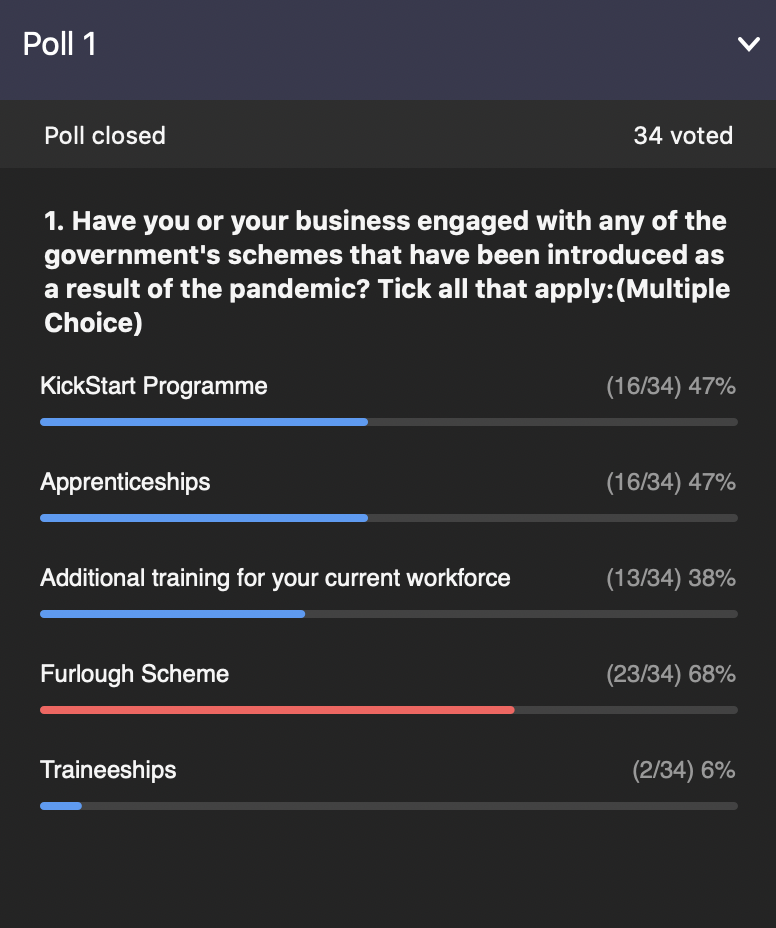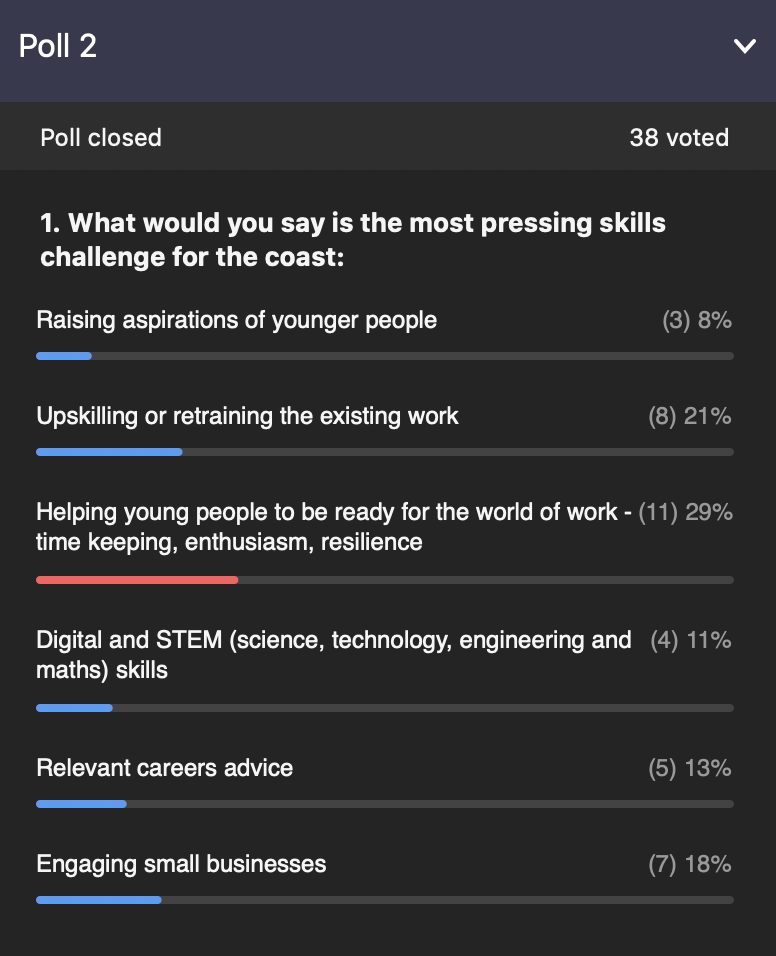Last week, the Coastal West Sussex Partnership and Platf9rm came together to deliver the third in a series of webinars.
Henry Powell, Chairman of the partnership and no stranger to employing apprentices at his factory in Littlehampton, kicked things off by explaining that the partnership’s key role is to bring together the public and private sector to define the path for the future of the region. Henry commented that although there are many businesses struggling, it’s important to acknowledge the enormous amount of flexibility and durability shown across the region.
Fiona Aldridge, Director of Policy & Research at the Learning and Work Institute spoke of the Government white paper on skills which had just been published. Fiona presented the recent labour market statistics which showed that employment is falling, redundancies remain high and, although support from the government has helped, that support will soon end and there is a big question over what else needs to be put in place.
In terms of what is likely to happen post COVID-19, Fiona talked of the sectoral impact of the pandemic in catering and hospitality, tourism and retail. Most people that lose their jobs in these sectors will have to retrain or upskill to find work elsewhere.
The major impact of the pandemic has been the exacerbation of trends – those economies that have been hardest hit are those that were weakest to start with. That’s the same with the jobs market unfortunately – those with lower-level occupations and qualifications are most at risk, at both ends of the age profile.
Fiona suggested three areas to address the challenge:
- Young people: we need a higher ambition than we had before the pandemic to create more opportunities for young people.
- Adult upskilling and retraining: we need a universal support offer to help at-risk workers into learning, career planning and job search, with more in-depth support for those needing to retrain to change career.
- Filling the jobs gap: we need investment to create jobs, stimulate job creation and protect existing jobs
Fiona described the challenge as ‘immense’ and said that it will take all of us working together to achieve it. The white paper talked of a move towards collaboration which Fiona applauded.
Gillian Keegan MP for Chichester and Minister of Apprenticeships and Skills proclaimed that skills and Sussex are her two main passions.
In the first six weeks into her ministerial role, before the pandemic hit, every meeting Gillian attended focused on skills shortages across almost every sector from nursing, policing, care, mental health, construction, farming, agriculture.
As the world starts to rebuild after the pandemic, all governments will have the same challenge with the same sectors affected most. The UK also has the impact of Brexit hitting at the same time.
Gillian offered good example of business and education working together – she was on the board of Governors at St Richard’s hospital and couldn’t believe they were recruiting nurses in the Philippines when she knew of several girl guides in the area interested in pursuing a career in nursing. There’s now a nursing school being set up in Chichester. Dave Cooper from the University of Chichester added that they had already received 140 applications for the nursing school launching in September.
Gillian’s goal: “I want to make Sussex a fabulous example of what we can do when we work together”.
A poll was taken to establish which the attendees had taken advantage of:

Given the low number of people that had taken advantage of traineeships it was clear that there was more needed from Government to promote this scheme as very few people on the webinar had heard of it.
Richard Hopkins is the MD of Fargro, Chairman of WS Grower’s Association and on the board of Coast to Capital. He had recently been involved in a skills project to establish all the different skills needed in the horticulture sector – it will be published next week. The skills range from leadership and management, energy management, tech, business growth and exporting – actual horticulture skills were number five on the list! This proves that it’s not always clear what skills are required for jobs.
Jeremy Pardy, the Resort Director of Butlins, has over 1,000 employees. Bourne Leisure has made a commitment for 1,000 roles through the Kickstart programme which will mean 20 or 30 at Butlins in Bognor Regis.
The panel were asked for the top three practical ways that employers can help bridge the skills gap.
Gillian’s advice was to get involved with the Kickstart scheme and apprenticeship scheme and look out for the new Bootcamps where employers can build a 12–16-week intensive course to get people trained up in a specific skill they are missing.
Richard Hopkins recommended a website www.liketobe.org – an online network which helps introduce students to professional online networking and creates regular employer engagements. He also pleaded with the BBC to promote the opportunities out for there for employer engagement.
Work experience can be tough for small businesses to offer, but there are other ways they can get involved such as engaging with local education providers and talking to students about working in their sector.
Dave Cooper talked about the great apprentice case studies he has, including an example of some apprentices that were almost running Henry Powell’s business due to a COVID-19 caused crisis. He encouraged businesses to talk to the universities and colleges about how they could help them. His advice on the top three things employers could do to help would be to take on three apprentices.
Another poll was taken – this time on the most pressing skills challenges for the coast:

Jeremy talked about the need for more flexibility from employers, for more listening about the hours that the workforce wants – he used to offer fixed days and times but is now offering much more flexibility so that new recruits can fit roles around other jobs or responsibilities.
Frances Rutter, chair of the Coast to Capital skills advisory panel, advised employers to be more creative about what skills they are looking for with new recruits and consider including transferable skills. She also commented that there’s a role for a strategic organisation locally to help employers and signpost them to the best opportunities available to them. The partnership can certainly help with this!
Jeremy recommended creating short video case studies to show other employers how it all works in terms of employing apprentices.
The panel’s wish list for central government was:
- National input from a financial perspective but with local engagement with businesses
- More trust in the colleges and universities to deliver
- Reduced complexity of the training programmes
- Incentivise employers to recruit young people, as well as train them
- Simplify what’s already on offer, rather than layering more schemes over the top
- Empower and properly resource local areas – giving them the trust and freedom to make it work for their area
In summary, local businesses are being called upon to help bridge the skills gap by:
- Engaging with local educators about what they can do to help
- Get involved with the Kickstart programme
- Look to take on some apprentices
- Research the traineeship scheme and get involved where possible
- Offer flexible positions in terms of working hours/days
- Think creatively about transferable skills for the next role they advertise
- Look into the new Bootcamp scheme if there’s a particular skill the business is missing
- Create case studies of successful apprenticeship schemes with short videos to help other businesses get involved
